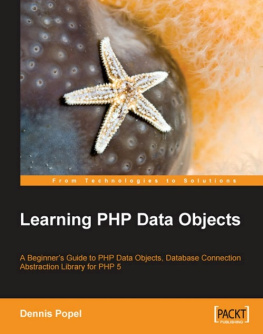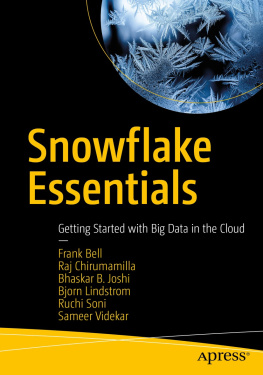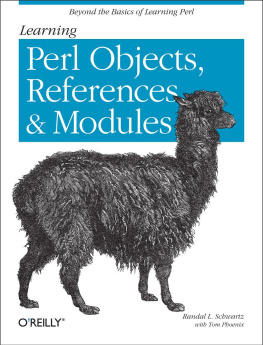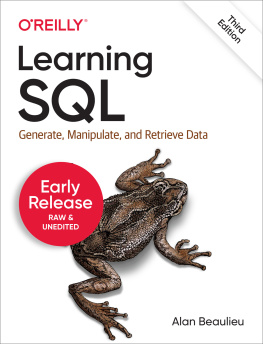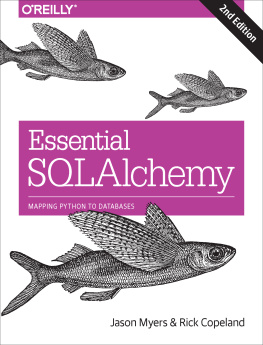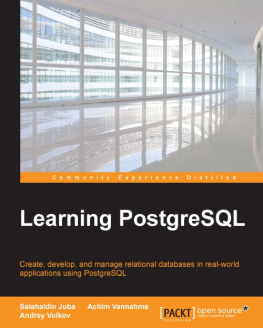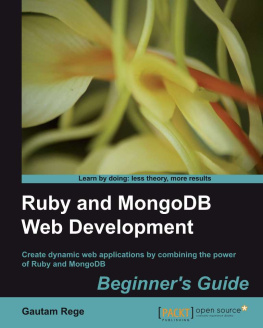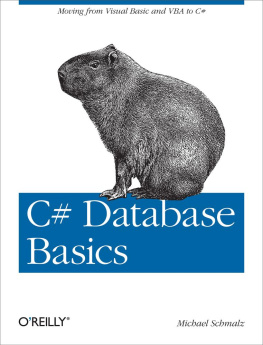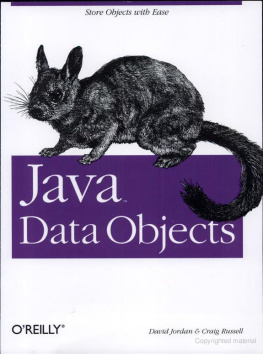Popel - Learning PHP Data Objects
Here you can read online Popel - Learning PHP Data Objects full text of the book (entire story) in english for free. Download pdf and epub, get meaning, cover and reviews about this ebook. City: Birmingham, year: 2007, publisher: Packt Publishing, genre: Computer. Description of the work, (preface) as well as reviews are available. Best literature library LitArk.com created for fans of good reading and offers a wide selection of genres:
Romance novel
Science fiction
Adventure
Detective
Science
History
Home and family
Prose
Art
Politics
Computer
Non-fiction
Religion
Business
Children
Humor
Choose a favorite category and find really read worthwhile books. Enjoy immersion in the world of imagination, feel the emotions of the characters or learn something new for yourself, make an fascinating discovery.
Learning PHP Data Objects: summary, description and annotation
We offer to read an annotation, description, summary or preface (depends on what the author of the book "Learning PHP Data Objects" wrote himself). If you haven't found the necessary information about the book — write in the comments, we will try to find it.
Popel: author's other books
Who wrote Learning PHP Data Objects? Find out the surname, the name of the author of the book and a list of all author's works by series.
Learning PHP Data Objects — read online for free the complete book (whole text) full work
Below is the text of the book, divided by pages. System saving the place of the last page read, allows you to conveniently read the book "Learning PHP Data Objects" online for free, without having to search again every time where you left off. Put a bookmark, and you can go to the page where you finished reading at any time.
Font size:
Interval:
Bookmark:
Copyright 2007 Packt Publishing
All rights reserved. No part of this book may be reproduced, stored in a retrieval system, or transmitted in any form or by any means, without the prior written permission of the publisher, except in the case of brief quotations embedded in critical articles or reviews.
Every effort has been made in the preparation of this book to ensure the accuracy of the information presented. However, the information contained in this book is sold without warranty, either express or implied. Neither the author, Packt Publishing, nor its dealers or distributors will be held liable for any damages caused or alleged to be caused directly or indirectly by this book.
Packt Publishing has endeavored to provide trademark information about all the companies and products mentioned in this book by the appropriate use of capitals. However, Packt Publishing cannot guarantee the accuracy of this information.
First published: September 2007
Production Reference: 2310807
Published by Packt Publishing Ltd.
32 Lincoln Road
Olton
Birmingham, B27 6PA, UK.
ISBN 978-1-847192-66-0
www.packtpub.com
Cover Image by Derek Heasley (<>)
Author
Dennis Popel
Reviewers
Dinangkur Kundu
Tahmid Munaz
Acquisition Editors
Nanda Padmanabhan
Viraj Joshi
Development Editor
Rashmi Phadnis
Technical Editor
Swapna.V.Verlekar
Project Manager
Abhijeet Deobhakta
Editorial Manager
Dipali Chittar
Project Coordinator
Zenab Ismail Kapasi
Indexer
Bhushan Pangaonkar
Proofreaders
Martin Brooks
Chris Smith
Production Coordinators
Shantanu Zagade
Manjiri Nadkarni
Cover Designer
Shantanu Zagade
Dennis Popel is an experienced PHP/PHP 5 developer currently working for an Australian web development company, Motive Media (www.motivemedia.com.au). Serving Sun Microsystems Australia, Luna Park Sydney, Alsco Holdings, and Pine Solutions, among others, Dennis leads company development of proprietary, web-based, software solutions. In his spare time, he runs the www.onphp5.com blog and works on an online RSS aggregator newzmix.com.
Dennis Popel has been developing with PHP for more than 5 years and is experienced in such fields as object-oriented design and MVC. Previously he has worked at Rapid Intelligence, another Australian-based web company, publisher of such popular titles as NationMaster.com, FactBites.com, and Qwika.com. In the past, Dennis was developing proprietary Java applications.
This book is devoted to all the people who introduced and guided me in this wonderful world of information technology.
Dinangkur Kundu completed his bachelor's degree in Information Technology from Central Queensland University, Australia. He has been working as a software engineer and network admindesigning, developing, and configuring. He has worked with a variety of 2nd, 3rd, and 4th generation languages. He has worked with flat files, indexed files, hierarchical databases, network databases, and relational databases, several Sun and HP servers to configure small and medium range office networks providing Internet service, Mail service, file share service, network-based printing service, backup service, and implementing several network-based applications. Currently, he works as Chief Technical Officer at Quantumcloud, developing and customizing LAMP- and WAMP-based web services. He enjoys producing high-quality software, web-based solutions, and designing secure network.
I would like to thank my family for supporting and inspiring my ongoing passion for software development and the resultant challenges of life near the bleeding edge. I would also like to thankMr. Jamil and Mr. Hasin, my close professional mentors andwho to this day remain close friends. You can contact me at<>
Tahmid Munaz is currently working in Relisource Technologies (www.relisource.com) as an SQA Engineer. He is also a volunteer in an association called SQABD (SQA Bangladeshwww.sqabd.com) as a Community Relations Manager. He has experience in conducting QA and Testing training and mentoring freshers for Testing and QA Career paths and Consulting.
He loves to keep in touch with other Technical Communities likeJPGroup, Dot_net_community, PHPExpert, and PHPResource. He is addicted to reading blogs and writing when he gets time. You can visit Tahmid's blog at http://tahmidmunaz.blogspot.com
I would like to thank Hasin, the author of "Wordpress Complete", who always inspired me. Thanks to my friend Mizan, the author of "MediaWiki Administrators' Tutorial Guide", who helped me in my reviewing as it was first time for me. Thanks to the Packt team for giving me the support for this startup, especially to Viraj, Rashmi, and Abhijeet. I really enjoyed reviewing and hope to do better in future. I had heard about the author of this book but had no chance to work together. It was a chance for me to work with him and feel proud to help him make a nice book. I would like to thank my Program Managers who have always helped me to do and learn in better ways: Sahadatul Hakim (Enosis Solutions).
This book will introduce you to one of the most important extensions to PHP that are available, starting with PHP version 5.0the PHP Data Objects, commonly known as PDO.
PHP grew in to a very popular web programming language due to its simplicity and ease of use. One of the key factors of this growing success is the built-in possibility to access many popular relational database management systems (RDBMS), such as MySQL, PostgreSQL, and SQLite, to name just a few. Today, most of the existing and newly created web applications interconnect with these databases to produce dynamic, data-driven websites.
While most PHP-enabled web servers are still running PHP versions prior to 5.0, the enhancements and performance improvements introduced with this new version will lead to wide acceptance of PHP 5 at all levels during coming years. This imposes the need to start familiarizing ourselves with all the advanced features available in this version today.
gives an overview of PDO along with a few features likes single interface for creating a connection, connection strings, uniform statement methods, and use of exceptions and a singe system of error codes.
helps to get you started with PDO, by creating a sample database and then by creating a connection object. It also introduces PDOStatement classes.
deals with various error-handling processes and their uses.
introduces prepared statements. It deals with using prepared statements without binding values, binding a variable, and binding a parameter to a prepared statement. We also take a look at how to work with BLOBs using streams so that we do not risk query failures.
helps us determine the number of rows in the returned result set. Also, we come across a new conceptscrollable cursors, which allow us to fetch subsets of rows from a result set.
talks about advanced uses of PDO and includes setting connection parameters, transactions, and methods of PDO and the PDOStatement class.
Font size:
Interval:
Bookmark:
Similar books «Learning PHP Data Objects»
Look at similar books to Learning PHP Data Objects. We have selected literature similar in name and meaning in the hope of providing readers with more options to find new, interesting, not yet read works.
Discussion, reviews of the book Learning PHP Data Objects and just readers' own opinions. Leave your comments, write what you think about the work, its meaning or the main characters. Specify what exactly you liked and what you didn't like, and why you think so.

